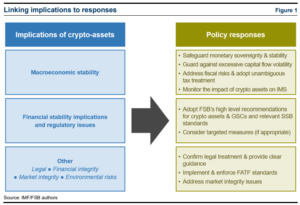
IMF, FSB Release Crypto Policy Recommendations
At the request of the Indian G20 presidency, the International Monetary Fund (IMF) and the Financial Stability Board (FSB) have published a joint paper containing policy recommendations.
The purpose of the paper is to combine the standards and consolidate the collective recommendations to provide guidance and assist various jurisdictions in addressing the risks associated with crypto asset activities.
The policy paper comprises recommendations for regulating stablecoin and decentralized finance (DeFi)-related activities. In addition, it describes how regulatory frameworks and policies devised by the IMF and the FSB can interact and complement one another.

Policy response recommendations to implications of crypto assets. Source: IMF/FSB
It does not, however, establish new policies, recommendations, or expectations for relevant authorities. According to the paper, stablecoins designed to maintain a stable value can suddenly become volatile and pose a significant threat to financial stability.
In regards to DeFi protocols, the paper argues that while the procedures used to provide DeFi services may differ from traditional financial platforms, DeFi “performs the same functions as the conventional financial system.
“Claims of decentralisation often do not hold up to scrutiny. Presently, DeFi may exhibit unclear, opaque, untested or easy-to-manipulate governance frameworks that may expose users to risks.”
The paper also noted that as DeFi endeavors to replicate some functions of the conventional financial system, it may exacerbate and inherit the inherent risks and vulnerabilities of conventional systems.
This may include mismatched liquidity and maturity, operational fragility, interconnectedness, and leverage. The article stated that the report also reaffirmed the IMF’s position regarding a blanket moratorium on cryptocurrencies.
The IMF noted on June 22 that prohibiting cryptocurrencies may not be effective in the long term. Instead of outlawing cryptocurrencies, the IMF suggested that authorities should focus on addressing the demand drivers for cryptocurrencies, such as consumer demand for digital payment methods.





